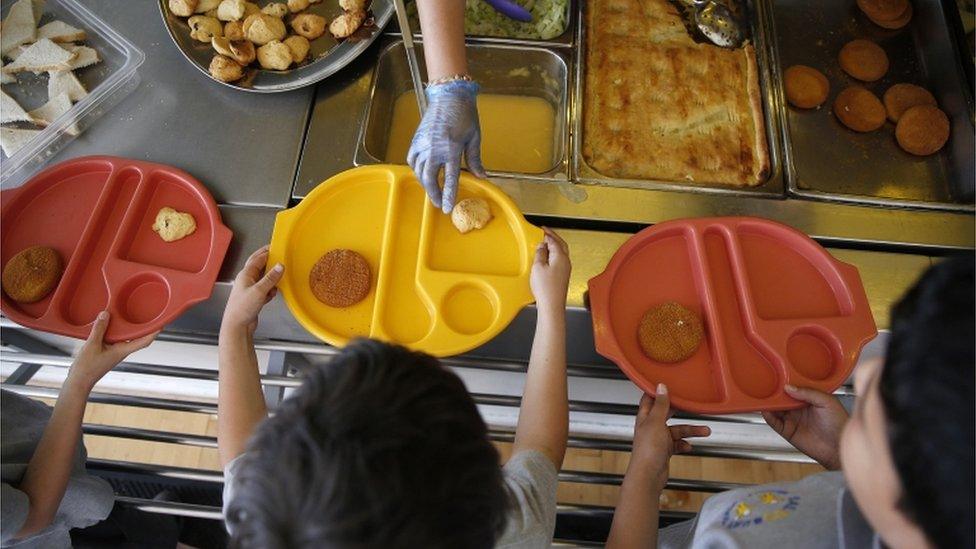Coronavirus: Call for cash to replace school meal vouchers
- Published

The pandemic has raised concerns children on free school meals could go hungry
The families of children entitled to free school meals should receive cash payments while schools are closed, according to campaigners.
BBC Scotland research has highlighted widespread variations in the support currently being provided by councils.
More than a third are providing meals, food packs or vouchers for specific shops.
But the Child Poverty Action Group, external is urging all councils to change over to cash payments.
Scotland's 32 local authorities are each responsible for their own system for supporting the families of children who receive free school meals during the coronavirus crisis.
But they only had only a few days to implement schemes after the decision was taken to close schools indefinitely.
BBC Scotland research revealed a wide variation in how help is offered:
13 are providing meals, packed lunches or food packs.
Three, including Glasgow, are issuing vouchers which can only be redeemed at Farmfoods.
Typically payments or vouchers are worth between £10 and £12.50 a week - but some councils, including North Lanarkshire and East Dunbartonshire, are offering a significantly greater level of support.
Inverclyde originally distributed packed lunches but due to supply issues it is changing to a system of payments worth £12.50 a week.
The Child Poverty Action Group says cash - rather than vouchers or food - should be the principal means of providing support across Scotland.
Director John Dickie said: "It's good to see many councils already making cash payments to help hard up parents meet the extra costs they are now facing as a result of children having to stay at home.
"Cash payments are the most effective way to protect and support most families, giving parents the greatest choice and agency to meet their family's needs at this exceptional time.
"They are a dignified response that avoid the stigma and lack of choice too often associated with vouchers or pick-up schemes."
Stigma risk
Mr Dickie urged all local authorities to move to cash payments, which can be made straight into bank accounts, as the primary replacement for free meals during the crisis.
South of the border, a scheme has been set up covering the whole of England to provide vouchers worth £15 a week which can be spent in the supermarket of the family's choice.
But there have been concerns about the way this scheme is being implemented.
Mr Dickie said the CPAG had not taken a view on whether there should be a consistent minimum level of payments as the cost of free school meals had varied from council to council.
But it has written to the Scottish government and council leaders arguing for cash payments.
The largest teachers' union, the EIS, said councils had to ensure that providing support for those entitled to free meals was done in a way that did not risk stigmatising them.


Councils had to devise methods to support children quickly. The decision to shut down schools was announced on 18 March and meant the following Friday was the last day at school.
However, by the time the decision was announced, many within education had realised a shutdown was inevitable and were already working on their plans.
There are pros and cons to all the means of providing support.
For example, it was possible to quickly start providing meals at hubs. However some would argue it could be humiliating or embarrassing for families to turn up at a hub to claim them.
Vouchers or payments into bank accounts are discreet but these may take longer to organise. Voucher systems can also help families who don't have bank accounts but it can be a problem if they can only be redeemed at specific stores.
Some might also argue that there can be no guarantee that all families would spend all of the cash payments on food for their children.

Glasgow City Council said almost £500,000 worth of food has been bought by families using pre-paid Farmfoods cards in the last two weeks.
The cards, which provide £10 a week have now been issued to more than 50% of pupils in the city.
A council spokeswoman said: "It's vitally important that we continue to provide for these families during this crisis.
"The cards are remotely topped up every two weeks without the need for families to draw cash from machines and thus observing the government guidance.
"With Glasgow's unique set of circumstances - we wanted a process that did not involve the need for internet access or even bank details - using the data we had at hand and would suit the diverse needs of all our families where possible."
A Scottish government spokesman said: "Free school meals are a vital measure for families, children and young people across the country, and we are supporting our local authority partners to ensure provision is continued.
"We are conscious councils have taken a variety of approaches, including some using voucher schemes.
"We are supportive of maintaining that local flexibility as what works best in one community will not necessarily work best in another community."

A SIMPLE GUIDE: How do I protect myself?
LOOK-UP TOOL: Check cases in your area
MAPS AND CHARTS: Visual guide to the outbreak

- Published14 April 2020

- Published31 March 2020
